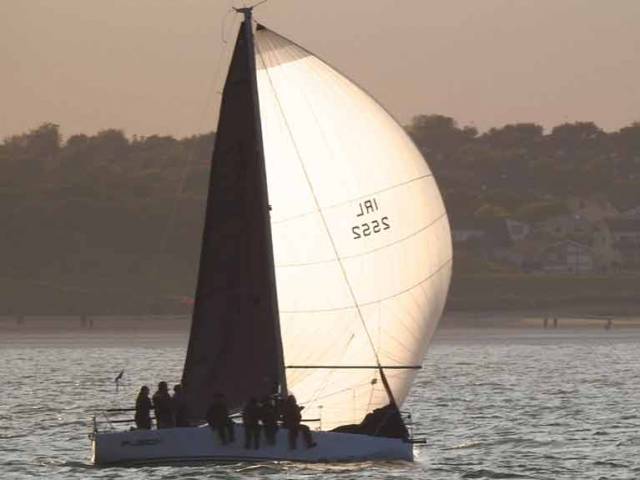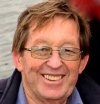When time is spent with Richard Colwell, who was elected as the new Commodore of the Irish Cruiser Racing Association in November, you’re quickly reminded of the saying: “If you want anything done, and done well, then ask a busy man to do it” writes W M Nixon.
For although he has been well known for at least a dozen years in top-level cruiser-racer competition in Ireland, he is much more widely known in public as the founder and CEO of RED C, the leading opinion polling and market research organization.
There is of course much more to RED C than those two pillars of activity. And in addition to a high profile in Ireland, it has an international presence thanks to its founder’s boundless energy, total enthusiasm, networking skills, and apparently endless capacity to make hard work seem relatively effortless.
But we’ll return to all that in due course. Initially, our interest lies in the fact that here he is – an affable Londoner born and bred – living very much at home in the heart of the distinctly eccentric maritime community of Howth. That would be quite enough for many people. But he also plays a leading role in local and national cruiser-racing, and is now the top honcho with its national organisation at a time when it can reasonably claim to be the branch of specialized sailing which has the greatest number of active adherents in the country. And all that in addition to a day job which, in modern multi-communication style, is essentially a 24/7 activity.
“If you want anything done, and done well, then ask a busy man to do it”
He learned his own sailing in sheltered waters very different from the rugged seas that are sometimes instantly encountered in sailing out through the mouth of Howth Harbour. His father was an editor at the noted London publishers Jonathan Cape, with one of his main responsibilities in looking after the firm’s perennially best-selling children’s books by Arthur Ransome, and that in turn led to early sailing on gentle waters.
As anyone who was reared in an Arthur Ransome household will know, sailing was often the pre-eminent activity in a series of very believable stories with which the young (and sometimes not-so-young) readers readily identified. Colwell Senior not only loved the books himself, but made a point of taking his family on holiday to the many interesting places where Ransome located his young sailors, such as England’s Lake District, the Norfolk Broads and the muddy but utterly fascinating creeks of the Suffolk and Essex coasts of the Thames Estuary.
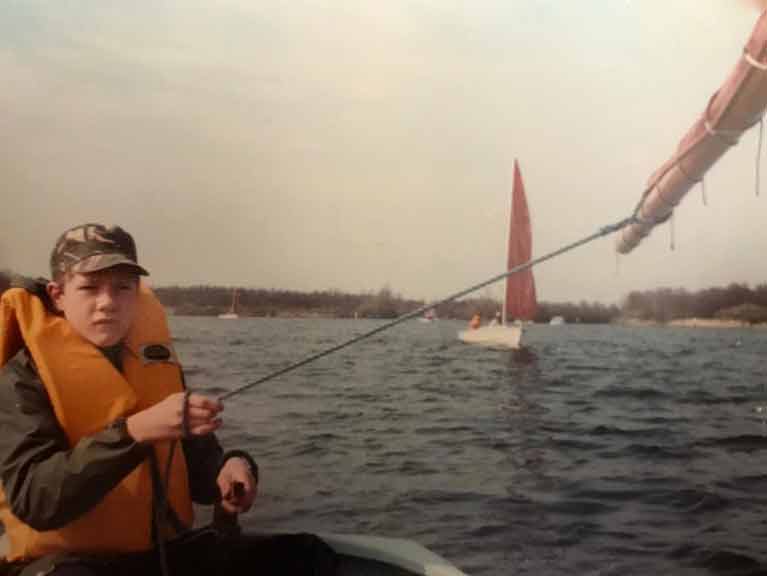 Early days. A young Richard Colwell learns his sailing on the sheltered waters of the Norfolk Broads
Early days. A young Richard Colwell learns his sailing on the sheltered waters of the Norfolk Broads
The Norfolk Broads are a sailing nursery, and though for reasons of family comfort the Colwells would sometimes hire a motor-cruiser rather than one of the characterful Norfolk Broads sailing charter craft, always there would be a dinghy in tow with some sort of sail rigged on it, giving young Richard his first taste of sailing.
But it was at school that his interest in it was most positively encouraged, as he went to a forward-looking secondary school which was keen to promote sailing, and at weekends sent a training group to Datchet Water where the now teen-aged Richard Colwell cut his competitive sailing teeth in Mirrors and Enterprises.
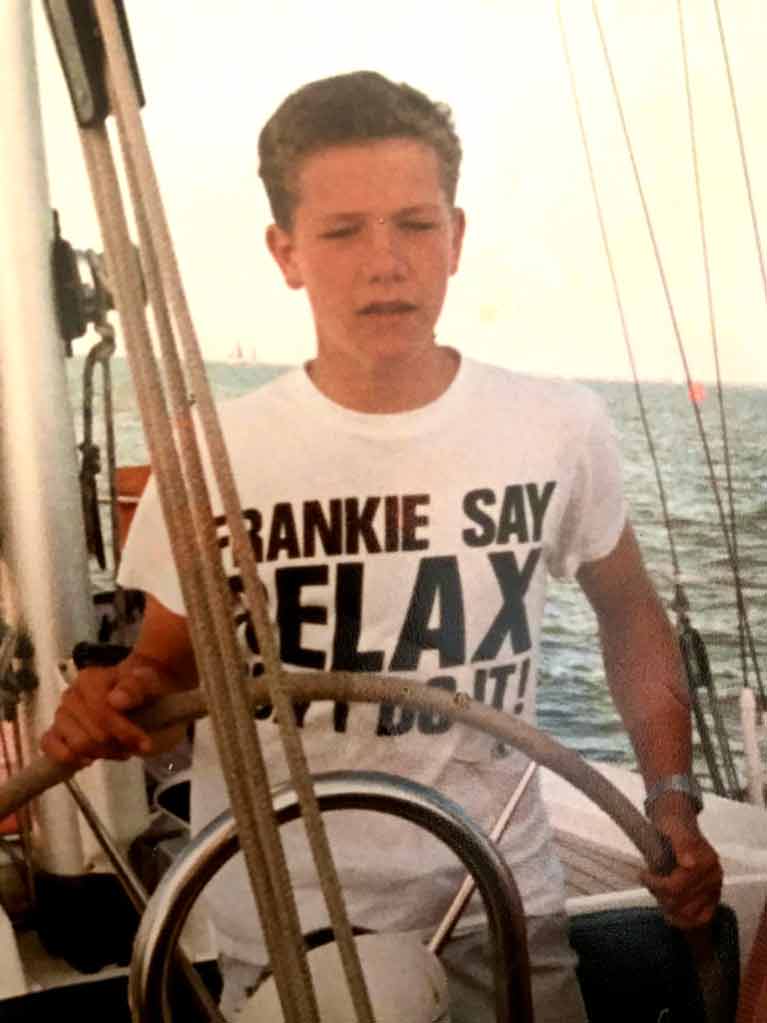 The man in charge – and a thought for the day on his T Shirt. Richard aged 15 in command of the watch, on an Oyster 54 ketch crossing the North Sea to the Friesian Islands.
The man in charge – and a thought for the day on his T Shirt. Richard aged 15 in command of the watch, on an Oyster 54 ketch crossing the North Sea to the Friesian Islands.
This strengthened friendships with other young sailors whose parents had cruisers and cruiser-racers on England’s East Coast, with the River Orwell - broadening below Ipswich on its way to the sea - becoming another focus of attention, providing cruiser-racing in boats around the 30ft mark, and several cruises in an Oyster 54 ketch. These included a well-remembered North Sea crossing to the Friesian Islands in an Oyster 54. Young Richard was just 15, yet the owner had sufficient confidence in his youthful crewman to leave him in charge for a night watch in a busy shipping area.
With approaching adulthood, working in London was increasingly his life-focus, and he found career fulfilment in the specialised arts of market research and public opinion polling. By this time, his main participation sport would have been rugby – he is still very much an avid supporter, though now of Ireland. But a bit of London remains in enthusiastic inherited support of Tottenham Hotspur, which he has backed through thick and thin towards today’s encouraging improvement.
However, the life-changing experience of those special London years was meeting Julie Wallace, who was working in the metropolis but came from a place he’d never heard of in Ireland called Howth, though he was well aware of Dublin. But as Julie came from a leading Howth sailing family – her father Vincent had been a Trinity College and dinghy sailor, and a successful campaigner of a Ron Holland Shamrock and a First 30 – visits to the new girlfriend’s family introduced him to a way of life which was not only lived in a hilly place, but had the sea at its most vigorous with a very active sailing club virtually within walking distance of home.
 Richard and Julie – she brought him home to Howth.
Richard and Julie – she brought him home to Howth.
In other words, it was a sailing scene about as different a possible from that in which he grew up. But increasingly regular visits to Howth, sailing with his now father-in-law on his Moody 40 Medimode in both the Irish Sea and later from a Malta base, drew him into the Howth scene, and after early married life in London, with their eldest child Ben now two years old, Julie enticed him back to Howth, and he has felt very much at home here in the twenty years since.
Arriving with his high-level London experience, he worked initially in Dublin with the established firm Lansdowne Research, but in 2003 he spread his solo wings by setting up RED C Research. It’s an eminently memorable name for which interested folk have provided any amount of interpretations, but Richard says it is simply the anagram of Research, Evaluation, Direction and Clarity.
Whatever, as it’s at the cutting edge of social psychology it provides endless scope for good or evil, but in the benign and useful form which RED C pursues, there is of course much more to it than the raised-profile public opinion polls which every so often hit the headlines, particularly if they’ve gone slightly off target. For there are also other extensive areas of advanced research which it does away from the public eye, projects whose ultimate result is for the general good, but inevitably there is not much sensational news in that area, even if some of us find it fascinating.
Certainly, it would be something which many less well-organized people might find so absorbing and time-consuming as to exclude almost everything else. But Richard Colwell is one of the best-organised people I’ve ever met, and with his sunny disposition, attractive intelligence, and remarkable ability to delegate, at the time he was setting RED C firmly on the road, he was also becoming increasingly active in Irish cruiser-racing. This was despite the fact that his work interests were taking on a more international aspect, for not only has he been Chairman for three years of AIMRO, the body that represents the market research industry in Ireland, but he is Irish representative on ESOMAR, the industry’s all-Europe organization, and is Vice President of WIN, a global network of research companies.
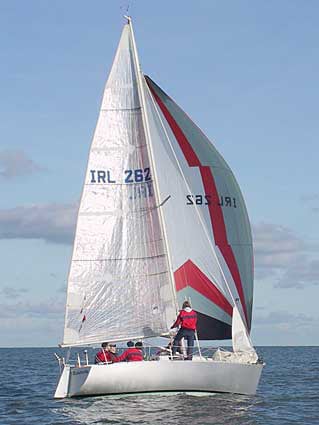 The first steps in cruiser-racer partnership were taken with the attractive and successful Albin Express Relativity, whose name is explained by the fact that Richard Colwell co-owner her in partnership with his sister-in-la Suzie and her husband Johnny Murphy
The first steps in cruiser-racer partnership were taken with the attractive and successful Albin Express Relativity, whose name is explained by the fact that Richard Colwell co-owner her in partnership with his sister-in-la Suzie and her husband Johnny Murphy
Though he’s interested in all sailing, it is the many aspects and subtleties of cruiser-racing which particularly appeal to him. He likes its ability to provide roles for people of many and varied abilities, he likes its capacity to create a team of whatever size the boat requires - a team of a unique structure which is both a democracy and yet a sort of benign autocracy at the same time - and he is utterly fascinated by the challenges of taking what is in effect a floating caravan – albeit an extremely austere caravan in many cases - and optimizing its capacity to be a sea-going racing machine, both in terms of making the best of the rig and the boat itself, and in squeezing the last possible benefit out of the rating process.
Then too, he admits that he finds nothing so adrenalin-including as working in towards the start line in a fleet of as many as forty or even more boats of varied types and speed, and somehow emerging from that melee in a good position with the continuous challenge of racing under sail, with all its attendant strategy and tactics evaluation in an endless all-involving process right to the finish.
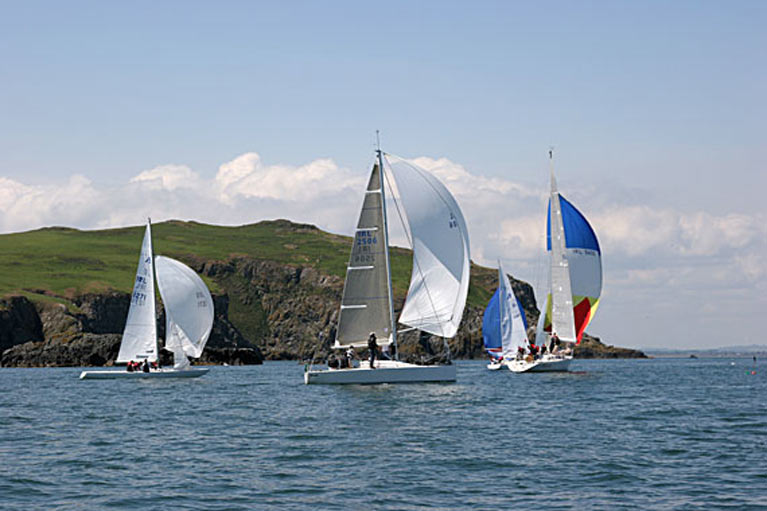 Local challenge – the Corby 25 Kinetic (centre) in the annual Lambay Race from Howth.
Local challenge – the Corby 25 Kinetic (centre) in the annual Lambay Race from Howth.
Unless it was sport, it would be very hard work indeed, yet although he had the demanding work of getting RED C up and running, he was already sailing in Howth with the likes of Kieran Jameson and Colm Bermingham, and then he was encouraged by his father-in-law Vincent Wallace into a cruiser-racer partnership with Vincent’s other sailing daughter Suzie and her husband Johnny Murphy of the renowned sailing family originally from Dunmore East, and in Howth they based and very actively campaigned the attractive Albin Express Relativity with considerable success.
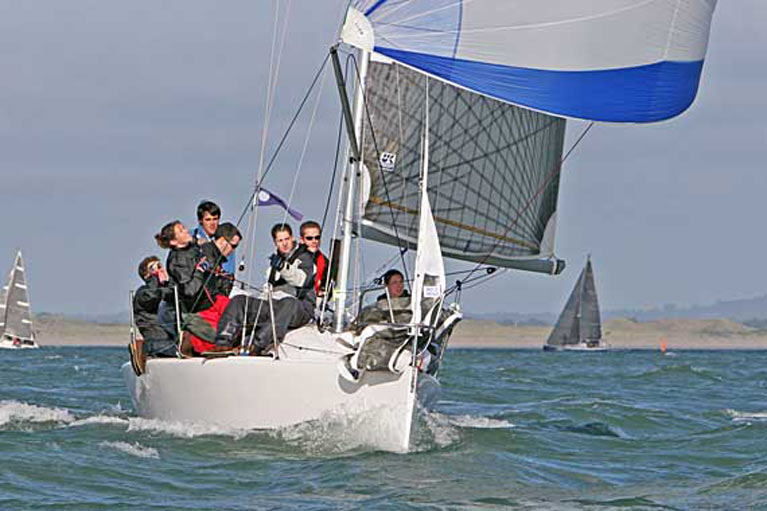 Kinetic in the Autumn League at Howth – she was always in the frame
Kinetic in the Autumn League at Howth – she was always in the frame
Then he and Johnny went for what was the sharp end - the extremely sharp end - with the Corby 25 Kinetic. John Corby’s skinny boat concept never seems more off-the-wall than in his 25-footers, yet Kinetic ticked all the boxes in being an IRC-rated boat in a hot class which provided all sorts of club racing, regional regattas, and national competition potential, and she was very much a force to be reckoned with, frequently in the frame and often at the top of it, during the intensive six years when Richard, Suzie and Johnny campaigned her.
Their sailing had become so intense that a break from competition seemed a good idea, but within a short time Richard found himself sailing again, this time as crew with Ronan Cobbe on his Mumm 24. However, the boat was simply too small, so the two of them formed a new partnership which became the Fusion team on another Corby 25, and the Colwell involvement with Irish cruiser-racing was ratcheted up still further.
His increasingly high profile and national enthusiasm had already been noted, with Howth Yacht Club Commodore Peter McKenna asking him to be an HYC representative on the Irish Cruiser-Racer Association Committee. With ICRA having a history of Commodores of the calibre of Jim Donegan, Fintan Cairns, Barry Rose and Nobby Reilly with the dedicated Denis Kiely doing the number-crunching, the Colwell role was initially advisory with market research services as the 2002-founded organisation grappled with the challenges of providing an annual National Championship for a fleet which by its very nature was inevitably diverse, while at the same time resolving between the demands of different sailing centres each of which felt – quite understandably – that every so often it was their turn by right to host that National Championship.
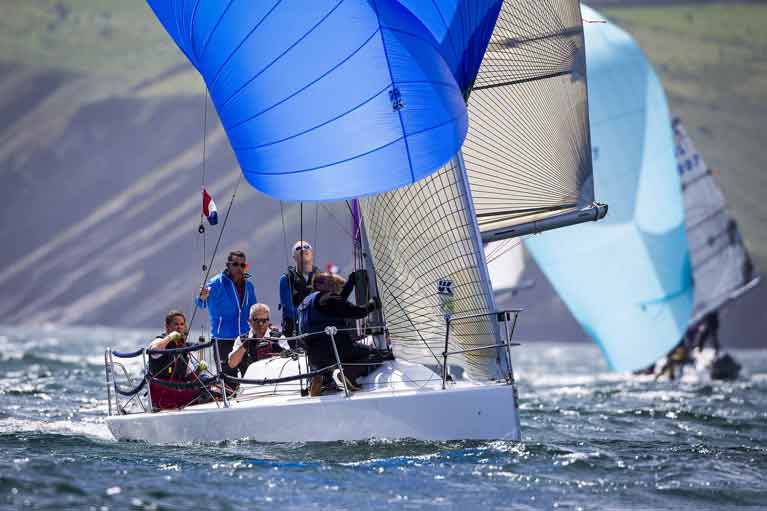 The new Corby 25 Fusion doing interesting things with her spinnaker in the Sovereigns Cup at Kinsale. Despite the experiments, she won this race. The boat may be only 25ft, but on board are (left to right) Suzanne Burke, Niamh McDonald, Ronan Cobbe, Richard Colwell, Craig Jeffares, Oisinn O’Donovan, and Ben Colwell Photo: ICRA
The new Corby 25 Fusion doing interesting things with her spinnaker in the Sovereigns Cup at Kinsale. Despite the experiments, she won this race. The boat may be only 25ft, but on board are (left to right) Suzanne Burke, Niamh McDonald, Ronan Cobbe, Richard Colwell, Craig Jeffares, Oisinn O’Donovan, and Ben Colwell Photo: ICRA
Until 2014, there was also the biennial task of co-ordinating Commodore’s Cup involvement. But like the Admiral’s Cup before it, the Commodore’s Cup has shrunk in appeal for Irish owners and skippers through expense, a process accelerated by the economic recession. Yet despite that, cruiser-racer numbers continued to increase at home, and under the Commodoreship of Nobby Reilly and his predecessors, ICRA secured the income previously going to the Irish Sailing Association which accrued from providing rating certificates, thereby achieving a stronger organizational base and a role with a higher profile. Yet although as the national authority Irish Sailing was professionally staffed, ICRA has continued to have its own ethos with an entirely voluntary administration, and personal enthusiasms and dedication closely affect the Association’s progress.
Thus the higher profile led to increased demands from growing fleets - particularly along the West Coast – for National Championship hosting rights, and with the Commodoreship now undertaken by the hyper-keen Simon McGibney of Foynes Yacht Club, it was arranged that the ICRA Nationals be staged at Galway, and the date set was mid-August 2018.
The organisers at Galway Bay SC put heart and soul into preparing for an event which would be staged from Galway Docks which inevitably involved the fleet transitting a sea lock for each day’s racing. It’s a schedule which has worked in times past for those accustomed to the Galway setup in the WIORA Championship, but for a fleet including visitors from larger sailing centres where easy 24-hour berthing access was taken for granted, it seemed potentially problematic. And when the weather went to pot, with such a succession of strong to gale force winds from the west that in the end no racing was held at all, the very future of ICRA as a viable body seemed to be at stake.
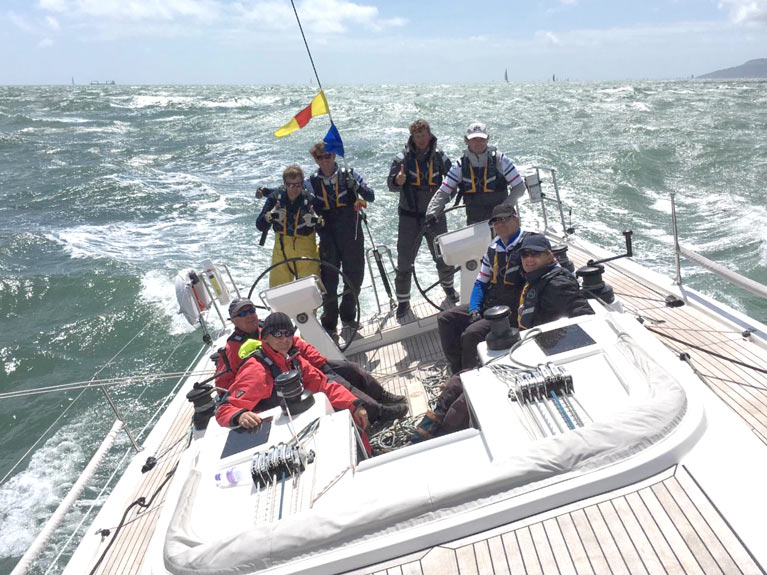 While they kept their focus on Ireland, the crew of Kinetic would occasionally give themselves a change of scene and boat size – this is racing the XP44 Simples in the Round the Island Race. Photo: Richard Colwell
While they kept their focus on Ireland, the crew of Kinetic would occasionally give themselves a change of scene and boat size – this is racing the XP44 Simples in the Round the Island Race. Photo: Richard Colwell
Even beforehand, there’d been many who said that the logistics of getting to Galway were too demanding at a time of the year when most east and south coast sailors were expecting quality holiday time with their families. But nevertheless for anyone with a small trailerable boat it was all very do-able, and Richard Colwell and Ronan Cobbe had been in the midst of the frustrated fleet in Galway Docks with Fusion, enthusiastic as ever and keen to race.
But with the doubts expressed beforehand, Richard had also been asked to do a survey of where the majority of ICRA sailors preferred to have the championship, and this was backed up by a study undertaken by fellow ICRA Committee Member Ric Morris.
Basically, the answer was: “Follow the numbers”. While everyone acknowledged the laudable idealism of rotating the championship around the country, the harsh reality was that most members reckoned the best path was to accept that, for the foreseeable future, the preferred locations are Kinsale, Crosshaven, Dun Laoghaire and Howth.
But even as that was being acknowledged, further balm was being provided for a decidedly bruised organization with the Royal St George Yacht Club in Dun Laoghaire stepping up to the plate in September with an agreement to stage the next ICRA Nationals in June 2019. And with the acceptance that for the foreseeable future the path for ICRA is going to be what the market hopes for, rather than what all-Ireland idealists might aspire to, the re-birth at the Dun Laoghaire venue from 7th to 9th June is now further supported by the recent welcome news that Dublin Bay Sailing Club has cancelled their racing on Saturday June 8th, thereby greatly increasing the appeal of participation in the Nationals.
Looking beyond this year, the ICRA Nationals 2020 will be part of Volvo Cork Week which is going to be one very busy regatta, but then Tricentenaries of the world’s oldest yacht club don’t come round every year.
Beyond that again, while numbers on the east coast may comfortably support a stand-alone ICRA Nationals, the south coast venues have to take account of the fact that they lack the personnel numbers that the Dublin monster provides, thus when ICRA is scheduled for Kinsale, it will be integrated with the Sovereigns Cup series. But on the east coast it will be kept separate from the enormous fun-oriented Volvo Dun Laoghaire Regatta and the new-style Wave Regatta at Howth, as both involve many non-cruiser-racer classes which would make it very problematic to stage a clearcut ICRA Nationals in tandem with the main event.
So for ICRA under Richard Colwell’s leadership, it’s going to be a case of sticking to the knitting, and doing what they do best, which is catering for the specific needs of Ireland’s keenly-campaigned cruiser-racers, needs which extend far beyond the provision of a high-profile recognised National Championship.
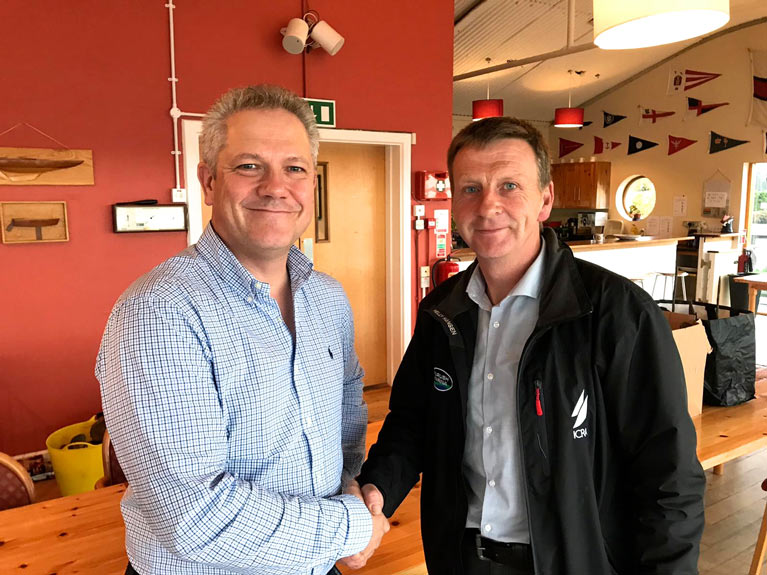 Richard Colwell takes over from Simon McGibney of Foynes YC as ICRA Commdore at Lough Derg YC in November 2018. Simon has continued as a member of the ICRA Committee
Richard Colwell takes over from Simon McGibney of Foynes YC as ICRA Commdore at Lough Derg YC in November 2018. Simon has continued as a member of the ICRA Committee
He took over the Commodoreship from Simon McGibney at a Special General Meeting in Lough Derg Yacht Club last November, and behind-the-scenes work since then resulted in a new-look ICRA Committee meeting formally for the first time on January 16th. Afloat.ie has already reported on the immediate outcome of that, but Richard’s own mission as Commodore puts it clearly with his four main themes developing:
“1.Deliver a first class National Championship event - to ensure that this is an enjoyable national championships recognised as the pinnacle of competitive yacht racing in Ireland. To ensure that ICRA run the best events moving forward, the committee have worked very hard on creating a set of general rules and regulations under which events should be held. These will underpin all future events and ensure members can be assured that their views have been taken into account. All of the major decisions were taken after consultation with members, and were finally agreed after a formal vote among committee members that represent clubs around the country.
2. We have also developed a New Boat of The Year process, that will allows yachts to build up points across a number of nominated events that they participate in across the country. This will take the mystery out of who wins this coveted award each year, and make it very transparent.
3. In terms of maintaining yacht racing standards, we work hard to liaise with IRC, with specialists like Mark Mills and others attending most of our meeting and conferences. We have also moved to improve standards by including On-the-Water Judges and technical boat checks at the Nationals. One other area that we have identified as something we want to work hard on is the national use of the ECHO handicap system. Members have made clear that the system needs some fresh thinking, to ensure it works as it should and delivers great racing and the opportunity to win events for boats across the fleet. We would like to invest time and money into trying to deliver a better system for all, where ECHO handicaps can be transferred between events in different parts of the country, utilising a central online database. At the moment this is at the planning stage, but we hope this can be actioned when funding has been agreed.
4. Finally, we are working hard to support pathways and encourage cruiser racing to a wider audience. The sports needs more people sailing, and whatever we can do to encourage this is important. We have designated a committee member, Kieran O'Connell of Royal Cork YC, to have responsibility for training grants, and in particular our support of the Under 25's pathways. We are working on supporting clubs who don't have them to develop Under 25 teams, and ICRA will also support their training and event entry through a series of grants. Over and above this, we also have a range of general training grants available for clubs to access, that will provide support for training events in cruiser-racing across the country. Grants need to be applied for by the club, with forms available on the ICRA website, and we encourage clubs to take advantage of these”.
 Family tradition – Richard Colwell and his son Ben, who is now 22 and very much a part of the planned campaign for the newly-acquired J/109 Outrajeous
Family tradition – Richard Colwell and his son Ben, who is now 22 and very much a part of the planned campaign for the newly-acquired J/109 Outrajeous
In an intense and energetic community like Irish cruiser-racing, leadership by example is arguably the best way forward, and in this case, actively campaigning one’s own cruiser-racer is virtually a job requirement. In Richard Colwell’s case, it is given a special spin, as he has always owned his boats in partnership, and a high priority for family values and involvement is integral to his way of sailing.
Thus as he faces into his first season as Commodore, he is also in the midst of a fresh boat-owning project, as he has moved on from the successful linkup with Ronan Cobbe on the Corby 25 Fusion to re-join his brother-in-law Johnny Murphy in the new ownership of the recently-acquired and lightly-used J/109 Outrajeous.
His son Ben, now 22 and in process of graduating from Trinity College, is a very important part of the equation, as almost from the start his sailing interests have gravitated towards cruiser-racing. He did his standard childhood duty afloat with a year in Optimists but subsequently much preferred to sail two-handed dinghies, and as soon as he could play a real role in his father’s current cruiser-racer, he took that route and provided the overall crew panel with access to rising star helms and other young specialists on the dinghy scene.
He also acquired deep sea experience, the most recent being a voyage to northwest Spain in grandfather Vincent Wallace’s Sun Odyssey 43 Poimandres with salty senior crewmates Kieran Jameson and Aidan MacManus (the latter providing the bonus of superb onboard cuisine). So young Ben approaches the season with a solid background in most aspects of sailing, and the proposed programme for Outrajeous well reflects the kind of competition that a dyed-in-the-wool ICRA enthusiast would expect.
It will start with training weekends and the Spring Warmers at Howth, and continue with the J/109 East Coast Championship followed by the Lambay Regatta, then continue on through the ICRA Nationals from June 7th to 9th, with the Volvo Dun Laoghaire to Dingle race just three days later, starting on Wednesday June 12th.
Then it’s halfway back to Howth again, with participation in the Sovereigns Cup at Kinsale from 26th to 29th June, before returning to the East Cast and re-grouping for the Volvo Dun Laoghaire Regatta from July 11th to 14th.
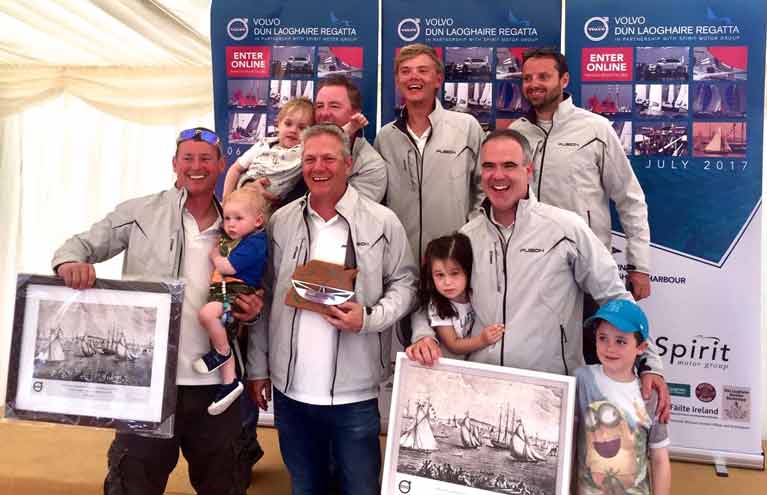 The joy of sailing with family and friends. The Fusion crew (with supporters) after a clean sweep at the Volvo Dun Laoghaire Regatta 2017 are (left to right) Ronan Cobbe, Hugo Cobbe, Rhys Cobbe, Richard Colwell, Oisin O’Donovan, Ben Colwell, Sophia Jeffares, Craig Jeffares, Peter Bayly and Christopher Jeffares. Photo: VDLR 2017
The joy of sailing with family and friends. The Fusion crew (with supporters) after a clean sweep at the Volvo Dun Laoghaire Regatta 2017 are (left to right) Ronan Cobbe, Hugo Cobbe, Rhys Cobbe, Richard Colwell, Oisin O’Donovan, Ben Colwell, Sophia Jeffares, Craig Jeffares, Peter Bayly and Christopher Jeffares. Photo: VDLR 2017
After that, the Colwell-Murphy combo have left it all clear until the Howth Autumn League and the J/109 Nationals, for although there’ll doubtless be events available among which some of the Outrajeous crew will happily pick and choose, as Andrew Algeo so sagely observed recently in his own reasons for trading down to a smaller boat less demanding of personnel, the reality of contemporary Irish life is that August is family holiday time.
While some boats solve that with Calves Week at Schull, for others it’s best not to commit to anything too ambitious. But whatever Outrajeous does during that more relaxed period, we can be quite sure that throughout the season Richard Colwell will be unobtrusively and carefully monitoring what works best for Irish cruiser-racer crews. He’ll be quietly moving the programme along in a way that reflects what works best, and what might be usefully possible, rather than forcing the pace for some unattainable and over-ambitious ideal. He’s someone who lives very much in the real world, and ultimately any idealism he has is of a beneficial and realistically attainable type.



























